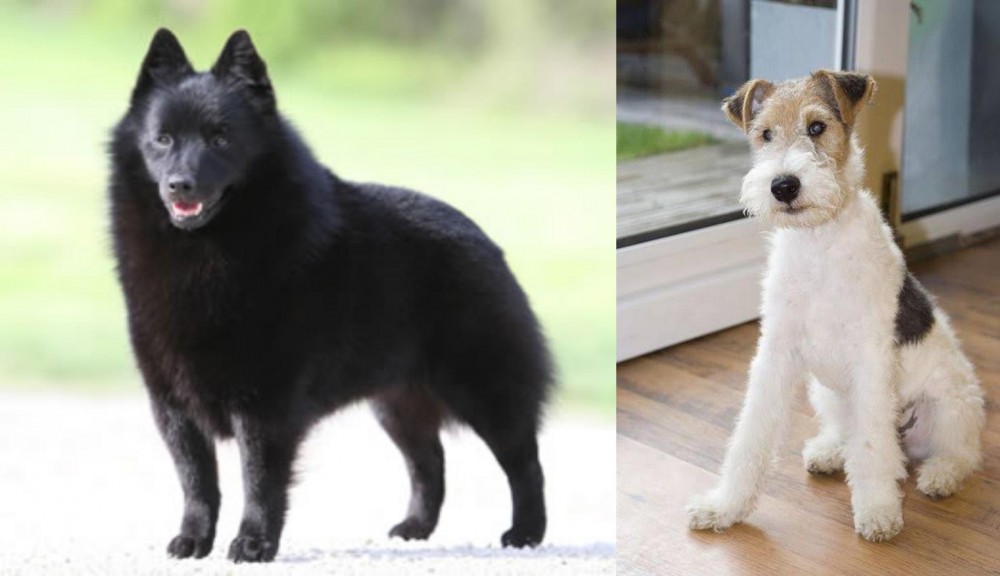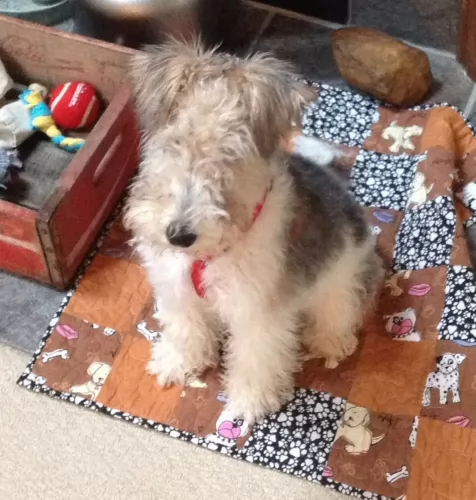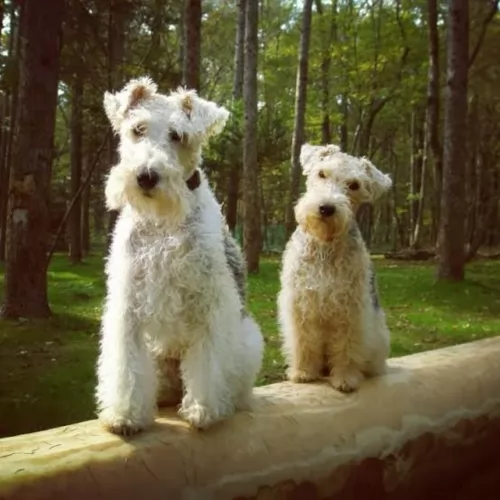 Petzlover
Petzlover Schipperke is originated from Belgium but Wire Fox Terrier is originated from United Kingdom. Schipperke may grow 6 cm / 2 inches shorter than Wire Fox Terrier. Both Schipperke and Wire Fox Terrier are of same weight. Both Schipperke and Wire Fox Terrier has almost same life span. Both Schipperke and Wire Fox Terrier has almost same litter size. Schipperke requires Low Maintenance. But Wire Fox Terrier requires Moderate Maintenance
Schipperke is originated from Belgium but Wire Fox Terrier is originated from United Kingdom. Schipperke may grow 6 cm / 2 inches shorter than Wire Fox Terrier. Both Schipperke and Wire Fox Terrier are of same weight. Both Schipperke and Wire Fox Terrier has almost same life span. Both Schipperke and Wire Fox Terrier has almost same litter size. Schipperke requires Low Maintenance. But Wire Fox Terrier requires Moderate Maintenance
 The Schipperke is a small dog which hails from Belguim and where he is known as a Spitz.
The Schipperke is a small dog which hails from Belguim and where he is known as a Spitz.
There are however different theories regarding the Schipperke’s origin. It was however during the late 1800s, that Belgian Schipperke fanciers set a standard for the breed.
It was in 1888 that the first Schipperke was imported to the United States and a specialty club for the breed founded in 1905.
 The wire fox terrier was developed in England by fox hunting enthusiasts. They wanted a feisty dog that could chase foxes down their burrows.
The wire fox terrier was developed in England by fox hunting enthusiasts. They wanted a feisty dog that could chase foxes down their burrows.
It is thought that the dog descended from the rough-coated black and tan working terriers of Wales.
The dog wasn’t popular as a pet until the 1930s when its appearance in certain films gave it a popularity-boost.
 This little Belgian dog stands at between 25 and 33cm in height and weighs between 3 and 9kg.
This little Belgian dog stands at between 25 and 33cm in height and weighs between 3 and 9kg.
The double coat of the dog is fairly short, but thick and it comes in a range of colors, but always solid, from chocolate to apricot to black.
A typical characteristic of his is the longer-haired ruff around his neck. He also has this longer hair around the hind legs. He has sharp, erect ears and the tail is a natural bobtail or long. Most people choose to have the tail docked.
These little dogs are no pushover. He is stubborn, strong-willed and confident. They are lively, intelligent, curious and energetic and will require plenty of exercise.
Small though he is, he will certainly need training and socialization, otherwise he just goes his own way. Training him will ensure he is obedient and not so strong-willed. They get on well with children, but they tend to be aggressive with other dogs that they haven’t grown up with.
Bring him up the right way and he makes a splendid pet.
 The Wire Fox Terrier is a sturdy, medium-sized dog that weighs between 7 and 9kg and stands between 35 and 39cm at the withers.
The Wire Fox Terrier is a sturdy, medium-sized dog that weighs between 7 and 9kg and stands between 35 and 39cm at the withers.
The dog’s double coat is essentially white with brown or tan markings and can be medium length and wiry, tending to be curly too.
He is a light shedder. The face is long, without much shape and eyes appear to be fairly close together. The ears are fairly small and they fold forward toward the cheeks. The tail is docked and is held high.
This really is an intelligent dog and can’t tolerate being bored. It’s essentially a companion dog too and doesn't want to be separated from his owners for too long.
As a companion dog he is going to want a lot of attention. They’re independent and strong-willed and will benefit from training and socialization.
They are great around children but they do need to be supervised as they are inclined to nip, especially when highly excited. They also bark quite a bit and the owner might have to do something to stop this yapping, especially when the dog is bored.
 With his bright little face, the Schipperke dog is a surprising dog, being fearless, confident, protective and devoted – everything people looking for in an excellent pet want.
With his bright little face, the Schipperke dog is a surprising dog, being fearless, confident, protective and devoted – everything people looking for in an excellent pet want.
His small size makes him able to slot into life in the city or the countryside. He is also looked upon as low maintenance. Add to this the fact that he is intelligent too. He is a feisty dog, and that’s why we say he is surprising because while he can be your sweet companion dog, he can turn into a robust, feisty, daring little panther. He’s got everything going for him to make you a splendid pet.
 The Wire Fox Terrier is such a canine friend, ready to be with you no matter what you’re doing. They are social dogs and love being involved with their human companions.
The Wire Fox Terrier is such a canine friend, ready to be with you no matter what you’re doing. They are social dogs and love being involved with their human companions.
He is independent but still social and enthusiastic and you can describe him as the ideal family dog.
He is a bundle of energy, and when you bring him into your home, you’re going to get a family member who is playful, joyful, loving and loyal – your very best friend.
 The Schipperke has no real health problems that he specifically gets, and he can live to be 13 years or older.
The Schipperke has no real health problems that he specifically gets, and he can live to be 13 years or older.
Over-feeding, bad food choices and lack of exercise are going to shorten the lifespan of this dog. Some dog illnesses to be aware of with the Schipperke is cancer, bloat, epilepsy, dental problems and luxating patella.
This is a condition where the knee cap of the dog moves out of its natural position. The patella moving out of the normal groove of the thigh bone can be because of genetic or traumatic reasons.
The symptoms of luxating patella include limping, skipping along as well as an abnormal sitting posture. Arthritis can also set in. Strangely, many small dogs live all their lives with luxating patella and they live like that free of pain. However for many other dogs it can mean pain and it can require surgery.
 These are healthy dogs, and if you get your dog from a responsible breeder, he will have been checked for health conditions such as cataracts, hip dysplasia, and luxating patellas.
These are healthy dogs, and if you get your dog from a responsible breeder, he will have been checked for health conditions such as cataracts, hip dysplasia, and luxating patellas.
Cataracts are a problem with the lens of the eye. The lens focuses light and it should be crystal clear. A cataract obscures vision. Sometimes the cataract can be very small but other times it can grow to the size of the lens and then it can cause blindness.
Most times, dogs with cataracts can still see, and even though a dog may experience some confusion with a cataract, they don’t hurt the dog. They don’t go away on their own and will need to be removed surgically. If you see your dog has a cataract, consult your vet to get their opinion on the matter.
Your dog may be licking and scratching a lot and it may just be that your dog has a frustrating and irritating skin problem. This itching isn’t a disease but rather a cause of some disease.
There could be so many things that are causing your pet to scratch and it could be a skin disease, parasites or allergies. It can be terrible seeing the frustration it causes your pet and he will certainly need to see the vet.
 Dry kibble is always a good choice for dogs as its helps to keep the dog’s teeth clean. You want to make sure you buy one of the best quality foods, full of minerals and vitamins as opposed to fillers, colorants and preservatives. The food you give your Schipperke can have a huge impact on his health.
Dry kibble is always a good choice for dogs as its helps to keep the dog’s teeth clean. You want to make sure you buy one of the best quality foods, full of minerals and vitamins as opposed to fillers, colorants and preservatives. The food you give your Schipperke can have a huge impact on his health.
Your puppy will require 4 meals a day but later this becomes 2 bowls of food. To add some variety to your pet’s diet, feed him some home made food occasionally which can be added to his dry kibble twice a week.
Boiled chicken, brown rice or pasta and spinach, sweet potatoes and carrots are a healthy choice for your Schipperke.
Try and include some raw meat into the diet as this can help in fighting off horrible skin diseases. Make sure he has constant access to fresh, cool water.
Ensure regular vet checks for your dog, particularly when he is showing signs of being sick.
Check your pet for ticks and fleas. Parasites can be very bad for your pet’s health. Your dog will need all his vaccines to stave off deadly canine illnesses.
Brush your Schipperke twice a week to make sure you get rid of loose hairs. A Schipperke doesn’t shed a lot.
Keep his nails trimmed. If you are unsure on how to do this, professional groomers can do this for you.
Ears and eyes should also be checked.
He’s an energetic little dog so make sure that he gets lot of excellent forms of exercise from walking to hikes to ball games, frisbee – you name it, you won’t tire him out easily.
 This dog will need to be brushed regularly. Some people hand-strip their dogs. Most people prefer just to take their pets to a professional groomer to have them professionally clipped. The groomers will simultaneously clip his nails, clean the inside of his ears and also clean his teeth.
This dog will need to be brushed regularly. Some people hand-strip their dogs. Most people prefer just to take their pets to a professional groomer to have them professionally clipped. The groomers will simultaneously clip his nails, clean the inside of his ears and also clean his teeth.
The Wire Fox Terrier will expect you to supply him with high-quality dog food if you opt to use commercially manufactured dog food. These foods can be wonderfully convenient but you want the food to be packed with natural ingredients and be high in vitamins and minerals.
Any diet should also be appropriate to the dog’s age, his size, and his activity levels. Some homemade foods can also be a treat but this needs to be simple with no heavy spicing. Things such as boiled chicken, brown rice and vegetables can be an excellent choice.